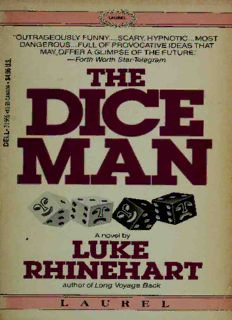
The Dice Man PDF
Preview The Dice Man
LAUREL ]J "OUTRAGEOUSLY FUNNY...SCARY, HYPNOTIC...MOST DANGEROUS...FULL OF PROVOCATIVE IDEAS THAT MAY OF—FER A GLIMPSE OF THE FUTURE." CO Forth Worth Star-Telegram THE at a to to Q d y:;;^ A novel by LUKE RHINEHART author ofLong Voyage Back LAUREL THE DICE MAPI ''The Dice Man is (1) hilarious, (2) revolting, (3) the most amoral yam I've read in years, (4) a serious moral parable about chance and the human condition, (5) a pornographic put-on, (6) crap. Now shoot me the —dice." Mary Ellen Barrett, Cosmopolitan ''Brilliant much like Catch-22r . . . — The Houston Post "Witty, reckless, and clever ... a cap—er at the edge of nihilism ... the vacuum of the will Rhinehart has diagnosed the malady brilliantly." — Melvin Maddocks, Life^ "A brilliant novel extremely funny and very impressive." . . . — Colin Wilson "The most compulsive first novel I have ever experienced since John Fowles' The Collector. It also happens to be a very much better book." — ^John Harder, Books and Bookmen "Weird, hilarious ... an outlan—dishly enjoyable book." St. Louis Post-Dispatch ALSO BY LUKE RHINEHART M atari Long Voyage Back THE MAN DICE Luke Rhinehart Published by Dell Publishing Co., Inc. 1 Dag Hammarskjold Plaza New York, New York 10017 © Copyright 1971 by George Cockcroft All rights reserved. No part of this book may be reproduced or transmitted in any form or by any means, electronic or mechanical, including photocopying, recording or by any information storage and retrieval system, without the written permission of the Publisher, except where permitted by law. ® TM Laurel 674623. Dell Publishing Co., Inc. ISBN: 0-440-31966-8 Reprinted by arrangement with the author Printed in the United States of America — First Laurel printing July 1983 Preface 'The style is the man,' once said Richard Nixon and devoted his life to boring his readers. What to do if there is no single man? No single style? Should the style vary as the man writing the autobiography varies, or as the past man he writes about varied? Literary critics would insist that the style of a chapter must correspond to the man whose life is being dramatized: a quite rational injunction, one that ought therefore to be repeatedly disobeyed. The comic life portrayed as high tragedy, everyday events beihg described by a madman, a man in love described by a scientist. So. Let us have no more quibbles about style. Ifstyle and subject matter happen to congeal in any of these chapters it is a lucky accident, not, we may hope, soon to be repeated. A cunning chaos: that is what my autobiography shall be. I shall make my order chronological, an innovation dared these days by few. But my style shall be random, with the wisdom of the Dice. I shall sulk and soar, extol and sneer. I shall shift from first person to third person: I shall use first-person omniscient, a mode ofnarrative generally reserved for Another. When distortions and digressions occur to me in my life's history I shall embrace them, for a well-told lie is a gift of the gods. But the realities of the Dice Man's life are more entertaining than my most inspired fictions: reality will dominate for its entertainment value. I tell my life story for that humble reason which has inspired every user of the form: to prove to the world I am a great man. I To shall fail, of course, like the others. be great is to be misunderstood,' Elvis Presley once said, and no one can refute him. I tell of a man's instinctive attempt to fulfil himself in a new way and I will be judged insane. So be it. Were it otherwise, 1 would know I had failed. In the beginning was Chance, and Chance was with God and Chance was God. He was in the beginning with God. Ail things were made by Chance and without him not anything made that was made. In Chance was life and the life was the light of men. There was a man sent by Chance, whose name was Luke. The same came for a witness, to bear witness of Whim, that all men through him might believe. He was not Chance, but was sent to bear witness of Chance. That was the true Accident, that randomizes every man that cometh into the world. He was in the world and the world was made by him, and the world knew him not. He came unto his own, and his own received him not. But as many as received him, to them gave he power to become the sons of Chance, even to them that believe accidentally, they which were bom, not of blood, nor of the will of the flesh, nor of the will of men, but ofChance. And Chance was made flesh (and we beheld his glory, the glory as of the only begotten of the Great Fickle Father), and he dwell among us, full ofchaos, and falsehood and whim. — From The Book ofthe Die We are not ourselves; actually there is nothing we can call a 'self any more; we are manifold, we have as many selves as there are groups to which we belong The neurotic has overtly a . . . disease from which everybody is suffering . . . J.H. VAN DEN Berg My aim is to bring about a psychic state—in which my patient begins to experiment with his own nature a state of fluidity, change and growth, in which there is ho longer anything eternally fixed and hopelessly petrified. Carl Jung — The torch ofchaos and doubt this is what the sage steers by. Chuang-Tzu ! am Zarathustra the godless: I still cook every chance in my pot. Nietzsche Anybody can be anybody. The Dice Man
Description: